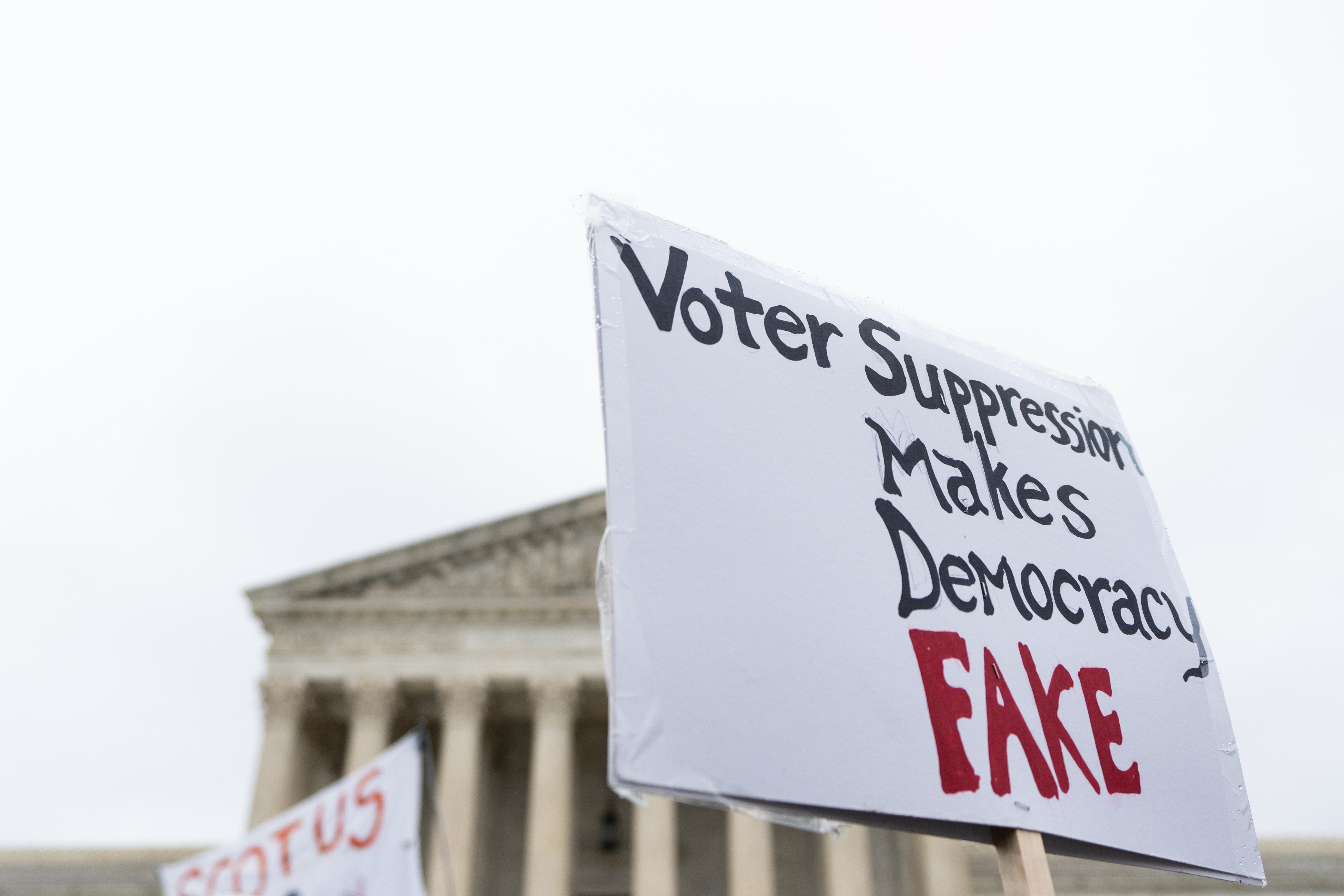Moore v. Harper: what the SCOTUS decision means for free and fair elections
The 6-3 decision from an overwhelmingly conservative court was a surprising rebuttal to North Carolina's Republican-held legislature


A free daily email with the biggest news stories of the day – and the best features from TheWeek.com
You are now subscribed
Your newsletter sign-up was successful
In one of its final acts of the 2023 term, the United State Supreme Court on Tuesday rejected an effort by North Carolina Republican lawmakers that would result in near-total state legislative control over federal elections without oversight, ruling that the U.S. Constitution "does not insulate state legislatures from the ordinary exercise of state judicial review."
The 6-3 decision in Moore v. Harper marks the end of a once-fringe conservative effort dubbed the "independent state legislature theory," which interprets the Constitution's Elections Clause and Presidential Electors Clause in such a way that would grant state legislatures virtually unchecked authority over their state's federal elections, including things such as redrawing electoral districts, altering voter identification rules, and adjusting mail-in ballot procedures, without any input — or recourse — by state courts or governors. Tuesday's ruling officially held that the North Carolina Supreme Court did not violate the Constitution when it overturned the state's Republican-drawn gerrymandered districts in 2022. "When state legislatures prescribe the rules concerning federal elections, they remain subject to the ordinary exercise of state judicial review," Chief Justice John Roberts wrote in the majority opinion.
"Huge national implications"
While formerly relegated to the far edges of conservative legal thought, the theory gained traction in recent years thanks in part to former President Donald Trump's effort to overturn the results of the 2020 election. Moreover, as former Federal Appeals Court Judge J. Michael Luttig asserted in a 2022 essay for CNN, this "independent state legislature theory" is part of Trump and his allies' plan to "overturn the 2024 presidential election," as well. "Trump and the Republicans can only be stopped from stealing the 2024 election at this point if the Supreme Court rejects the independent state legislature doctrine," Luttig, a one-time advisor for former Vice President Mike Pence, wrote.
The Week
Escape your echo chamber. Get the facts behind the news, plus analysis from multiple perspectives.

Sign up for The Week's Free Newsletters
From our morning news briefing to a weekly Good News Newsletter, get the best of The Week delivered directly to your inbox.
From our morning news briefing to a weekly Good News Newsletter, get the best of The Week delivered directly to your inbox.
Upcoming presidential elections aside, Tuesday's ruling has "huge national implications'' on a more immediate scale, as well, said Mother Jones' Ari Berman. It could have "immediate ramifications in key battleground states like Wisconsin," Berman continued, noting that the incoming state Supreme Court's "new liberal majority" can now act to strike down the GOP's gerrymandered congressional maps.
Conversely, Fox News focused on the ruling's assertion that "state courts may not so exceed the bounds of ordinary judicial review as to unconstitutionally intrude upon" the legislative branch, reporting that "the 6-3 Supreme Court ruling could prevent judges from overriding state rules like some did in 2020."
In his dissenting opinion, arch-conservative Justice Clarence Thomas — joined by fellow conservative justices Samuel Alito and Neil Gorsuch — cautioned that Tuesday's decision "portends serious troubles ahead for the Judiciary," including scenarios in which elections "may be decided by a federal court's expedited judgment that a state court" overstepped its bounds in regards to that state's legislature.
"A time bomb"
Some election law experts have cautioned that although the broad rejection of the independent state legislature theory is a vital bulwark against unchecked electoral anarchy, the ruling nevertheless is vague enough at points to ensure future challenges. The issue will be litigated during the 2024 elections "until we get a clear definition of the boundaries on the federal constraint this decision recognizes on state court decision making," New York University Law professor Rick Pildes tweeted after the court's decision was published.
A free daily email with the biggest news stories of the day – and the best features from TheWeek.com
Law professor Richard Hasen agreed, warning "there's a time bomb" in this apparent victory for voting rights advocates. Ultimately, he argued in Slate, the ruling is worded in such a way as to "give the federal courts, and especially the Supreme Court itself, the last word in election disputes." This, he said in a separate analysis for Election Law Blog, means that because the Supreme Court "does not set out the precise contours of what [...] second guessing" a state court might look like, we may end up with something that "could be like the Bush v. Gore concurrence," which ultimately saw Republicans win the White House in 2000, "or some other standard" to be determined later.
In the end, surmised Franita Tolson, co-dean of the University of Southern California's Gould Law School, Tuesday's decision "reaffirms the status quo, at least to the extent that we have never lived in a world where state [courts] are free of federal [court] oversight."
Rafi Schwartz has worked as a politics writer at The Week since 2022, where he covers elections, Congress and the White House. He was previously a contributing writer with Mic focusing largely on politics, a senior writer with Splinter News, a staff writer for Fusion's news lab, and the managing editor of Heeb Magazine, a Jewish life and culture publication. Rafi's work has appeared in Rolling Stone, GOOD and The Forward, among others.
-
 The ‘ravenous’ demand for Cornish minerals
The ‘ravenous’ demand for Cornish mineralsUnder the Radar Growing need for critical minerals to power tech has intensified ‘appetite’ for lithium, which could be a ‘huge boon’ for local economy
-
 Why are election experts taking Trump’s midterm threats seriously?
Why are election experts taking Trump’s midterm threats seriously?IN THE SPOTLIGHT As the president muses about polling place deployments and a centralized electoral system aimed at one-party control, lawmakers are taking this administration at its word
-
 ‘Restaurateurs have become millionaires’
‘Restaurateurs have become millionaires’Instant Opinion Opinion, comment and editorials of the day
-
 ‘Poor time management isn’t just an inconvenience’
‘Poor time management isn’t just an inconvenience’Instant Opinion Opinion, comment and editorials of the day
-
 Kurt Olsen: Trump’s ‘Stop the Steal’ lawyer playing a major White House role
Kurt Olsen: Trump’s ‘Stop the Steal’ lawyer playing a major White House roleIn the Spotlight Olsen reportedly has access to significant US intelligence
-
 Japan’s Takaichi cements power with snap election win
Japan’s Takaichi cements power with snap election winSpeed Read President Donald Trump congratulated the conservative prime minister
-
 Supreme Court upholds California gerrymander
Supreme Court upholds California gerrymanderSpeed Read The emergency docket order had no dissents from the court
-
 How realistic is the Democratic plan to retake the Senate this year?
How realistic is the Democratic plan to retake the Senate this year?TODAY’S BIG QUESTION Schumer is growing bullish on his party’s odds in November — is it typical partisan optimism, or something more?
-
 How robust is the rule of law in the US?
How robust is the rule of law in the US?TODAY’S BIG QUESTION John Roberts says the Constitution is ‘unshaken,’ but tensions loom at the Supreme Court
-
 Why do Republicans fear immigration raids in North Carolina?
Why do Republicans fear immigration raids in North Carolina?Today’s Big Question Trump’s aggressive enforcement sparks backlash worries
-
 The ‘Kavanaugh stop’
The ‘Kavanaugh stop’Feature Activists say a Supreme Court ruling has given federal agents a green light to racially profile Latinos
